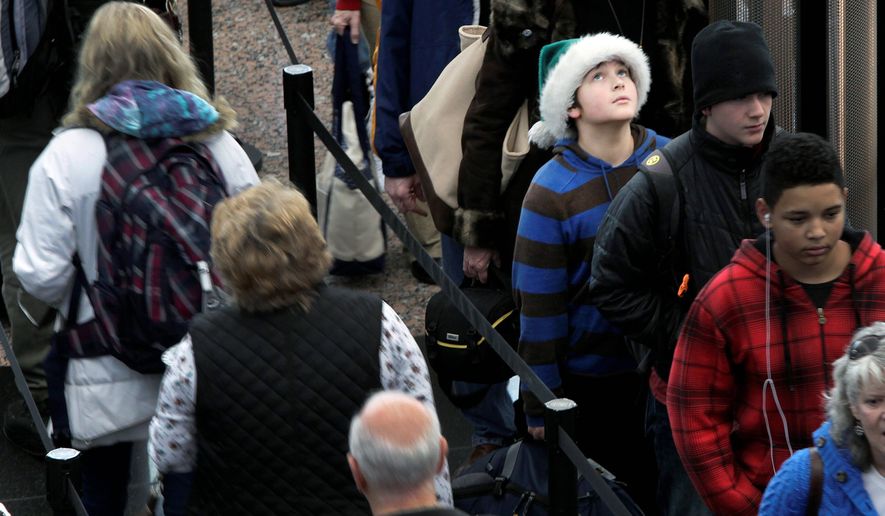U.S. travelers are indeed annoyed by the airport pat-downs and other enhanced security measures, but having to remove their shoes tops the list of air-travel hassles they would like the next Congress to address, according to an extensive industry survey released Tuesday.
Though passengers understand the need for heightened vigilance in the world of post-Sept. 11 air travel, roughly 75 percent said “there has to be a better way,” according to a survey conducted over the past few weeks by the U.S. Travel Association, a leading industry trade group.
The inconveniences directly affect the bottom line, analysts say, and industry executives say they are looking to the Obama administration and the 112th Congress for relief.
Roger Dow, the association’s president, called on lawmakers to acknowledge the survey findings and said a panel will release a series of recommendations in early 2011 that he hopes will become part of Washington debate.
“There’s a big opportunity with the new Congress coming in,” Mr. Dow said, adding that lawmakers should mount a response as extensive as the one during the H1N1 flu outbreak of 2009.
“We really need that type of serious-response approach,” he told The Washington Times.
The survey found that airport security procedures are hurting the U.S. economy. Respondents said they would take two or three more trips a year “if the hassle involved in flying could be reduced without compromising security.”
The nonprofit association - which represents the $700 billion travel industry - estimated that the additional trips would pump another $84.6 billion of travel spending into the U.S. economy, supporting 888,000 jobs.
“This is not just about the inconvenience, somebody’s grandmother going through security in a wheelchair,” said Bob Perkins, managing partner of Consensus Research, which conducted the survey. “This is a frustration issue with a huge economic impact.”
The Internet-based survey of 1,000 travelers was conducted between Nov. 29 and Dec. 10 and found widespread frustration and mistrust with the Transportation Security Administration’s (TSA) multitiered system for policing the nation’s airports.
The survey found that 37 percent of travelers object most to removing their shoes at security checkpoints, 31 percent object to undergoing a physical pat-down search by TSA officers and 25 percent object to going through a full-body image scanner.
Perhaps the most telling survey finding was that roughly 90 percent of respondents said a country that can put a man on the moon should be able to devise a security system that “doesn’t frighten or inconvenience travelers.”
A majority of those surveyed said air-travel security should be a top priority for the next Congress, which will have a Republican-controlled House when lawmakers convene in January.
Air travelers have endured long lines at security gates since the 2001 terrorists attacks and have removed their shoes after the so-called “shoe bomber” emerged. But their frustration appeared to reach a tipping point this year with full body scans and “enhanced” pat-downs after a Nigerian man with explosives in his underpants tried to blow up a Detroit-bound plane on Christmas last year.
The TSA said in November that only a small percentage of travelers were being subjected to the extra security and vowed to make the procedures “as minimally invasive as possible.” But the intrusive nature of the pat-downs became fodder for talk radio outrage and widespread cable coverage.
House Majority Leader Steny H. Hoyer, Maryland Democrat, said Congress would look into the controversy, but no hearings have been organized.
Rep. Peter T. King, New York Republican and chairman-elect of the House Homeland Security Committee, could not be reached about whether he will hold hearings.
Rep. John L. Mica, Florida Republican and the next chairman of the House Transportation and Infrastructure Committee, has been involved with the TSA since its beginning and remains a critic of its policies and spending.
Justin Harclerode, the committee’s GOP spokesman, said he had no concrete information about upcoming House hearings, “but Congressman Mica will definitely stay interested in these issues and making the TSA a more efficient agency,” he said.
The survey also found that roughly 80 percent of the 1,000 respondents support a “trusted traveler program” that would provide alternative screening measures for U.S. citizens who submit to background checks and meet other risk criteria.
• Joseph Weber can be reached at jweber@washingtontimes.com.old.




Please read our comment policy before commenting.